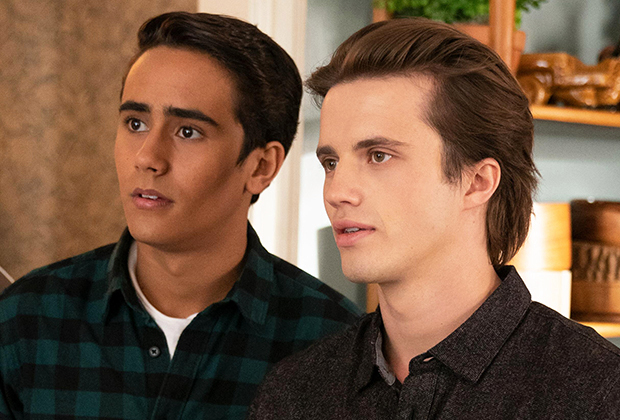When Love, Victor premiered on Hulu, it already came with baggage.
The series continuation of the hit Netflix film Love, Simon was initially intended for Disney+. But something about a series following a Latinx teenager coming to terms with his sexuality after moving from Texas to Atlanta just didn’t sit right with Disney, so the show moved over to Hulu.
The first season covered all the familiar beats of a teen’s coming out story, refreshed by the simple choice to make the family at the story’s center Latino. They also lucked out in terms of casting, scoring the always welcome Ana Ortiz and James Martinez as Victor’s parents. Nevertheless, there was Victor (Michael Cimino) fighting an attraction to his classmate and co-worker, Benji (George Sear); struggling to identify his feelings towards his new girlfriend, Mia (Rachel Hilson); and generally feeling anxious about life as the new kid in school and as a possible homosexual in a very Catholic family.
The results were sweet and tart in equal measure, with most of the latter supplied by Bebe Wood as the requisite gal pal that’s existed since the ’30s, though now the characters snap pop culture one-liners instead of gum. And though second seasons are always tricky propositions, Love, Victor seemed to be poised to again find new ways of telling well-worn stories. Except this time the focus wouldn’t be on yet another coming out!
But something went awry in Season 2. The joy and charm got sloughed off the writing and performances, and the idiosyncratic characters we’d come to love became miserable hollow shells almost simultaneously. A typical episode might find Victor fighting with his mother and her simmering homophobia while his friends look on awkwardly; best friend Felix struggling to hide his mother’s delicate mental equilibrium while trying to pay the rent; Mia getting drunk alone at college parties; and Victor’s family struggling with his parents’ separation.
Are these storylines meaty and undertold, especially from a teenager’s perspective? Absolutely. And Ortiz makes a meal out of her character’s unsympathetic actions, something most shows are too frightened to show in the theory that it might scare gay teens into staying in the closet. But everyone just seems so miserable, even when they’re in the throes of puppy love and losing their virginity.
Happy characters aren’t necessarily captivating characters, but the show’s embrace of discomfort feels like self-denial. By the time Benji and Victor have a massive fight over an enormous secret, it feels as if the show has decided its take on a coming out tale will be a measured, “Well, things could get rough.”
Things could (and do) get rough in real life, of course. Which is why there’s such a need to see characters sail through the rough patches shaken but unharmed. Love, Victor allows that by the end of the 10 episodes, but we end up feeling battered by the characters’ bad choices. A season cliffhanger that elicits, “Oh, a cliffhanger. Fun,” instead of a howl of dismay is never a great sign.




